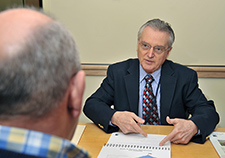Office of Research & Development |
 |
August 1, 2018

Dr. James Henry, with VA's National Center for Rehabilitative Auditory Research, is a pioneer in the management of tinnitus, a common condition among Veterans. (Photo by Michael Moody)
Progressive Tinnitus Management is an audiology program that has been adopted nationwide in both VA and Department of Defense clinics to treat tinnitus. The program was developed by the National Center for Rehabilitative Auditory Research (NCRAR) at the VA Portland Health Care System.
Tinnitus is ringing, buzzing, whistling, or other sounds in the ears without an external source. The condition can disrupt sleep, affect a person's work and social life, and sharply increase the risk of depression or anxiety. As of 2018, almost 2 million Veterans had a service-connected disability rating for tinnitus. Veterans are at higher risk than the general population because of their exposure to loud noise.
The program approaches tinnitus care with five different levels of treatment. Most patients need only basic education on how to manage the condition. As the levels progress, therapy gets more intensive and long-term. Patients needing higher levels of care might use sound generators or other approaches such as tinnitus masking or cognitive behavioral therapy. Patients at various levels might benefit from guided imagery, deep breathing, or other relaxation exercises, or simply more engagement in pleasant pastimes they enjoy.
NCRAR has developed clinical handbooks and other educational material on tinnitus care. A manual called How to Manage Your Tinnitus: A Step-by-Step Workbook is now used widely in VA clinics and patients.
VA researchers recently developed a telehealth version of progressive tinnitus management. A controlled trial showed that the program can improve tinnitus outcomes when delivered remotely. Video tele-PTM is currently being offered to VA patients in the Northwest region of the United States, and plans are underway to expand the program nationwide.
Principal Investigator: James Henry, Ph.D.; VA Portland Health Care System
Selected publications:
Telephone-based progressive tinnitus management for persons with and without traumatic brain injury: a randomized controlled trial. Henry JA, Thielman EJ, Zaugg TL, Kaelin C, McMillan GP, Schmidt CJ, Myers PJ, Carlson KF. Ear Hear. 2019;40(2):227-242.
Myers PJ, Griest S, Kaelin C, Legro MW, Schmidt CJ, Zaugg TL, Henry JA. Development of a progressive audiologic tinnitus management program or Veterans with tinnitus. J Rehabil Res Dev. 2014;51(4):609-622.
Henry JA, Thielman EJ, Zaugg TL, Kaelin C, Schmidt CJ, Griest S, McMillan GP, Myers P, Rivera I, Baldwin R, Carlson K. Randomized controlled trial in clinical settings to evaluate effectiveness of coping skills education used with progressive tinnitus management. J Speech Lang Hear Res. 2017 May 24;60(5):1378-1397.
Edmonds CM, Ribbe C, Thielman EJ, Henry JA. Progressive tinnitus management level 3 skills education: a 5-year clinical retrospective. Am J Audiol. 2017;26:242-250.
Henry JA, Zaugg TL, Myers PJ, Kendall CJ, Turbin MB. Principles and application of educational counseling used in progressive audiologic tinnitus management. Noise Health. 2009 Jan-Mar;11(42):33-48.